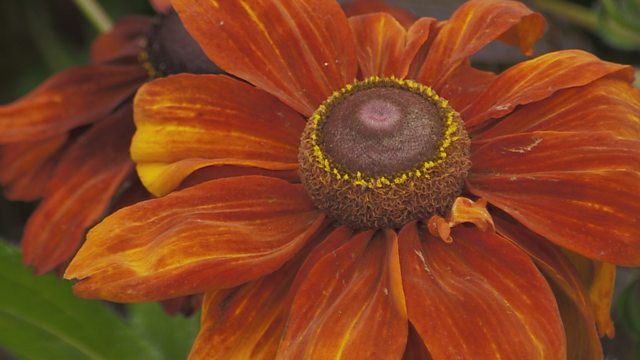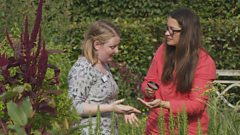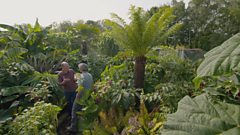
Episode 26
As autumn unfolds in the garden, Monty Don has plenty to be getting on with at Longmeadow. And in his quest to track down some of the nation's most remarkable allotments, Joe Swift visits a tropical paradise in Runcorn.
Last on
Clips
-
![]()
Alien invaders
Duration: 04:56
-
![]()
Stephen鈥檚 tropical paradise
Duration: 05:31
Stephen鈥檚 tropical allotment

Stephen Sorsa achieves the exotic look in his allotment by experimenting with a variety of perennial and tender plants. He finds that combining a variety of leaf shapes and textures gives him the tropical feel he loves so much. Once he has the foliage structure in place, he then injects shots of colour with annuals and biennials like echiums, amaranthus and leonotis. While Stephen has many favourites in his planting scheme, here are five he simply couldn鈥檛 live without:
- Cordyline australis (Cabbage palm) 聽This small, evergreen, palm-like tree is normally hardy in mild areas, but err on the side of caution and give it some protection if temperatures drop below -5掳C.
- Kniphofia caulescens (Red hot poker) 聽An unusual evergreen perennial with attractive grey-green leaves and fat spikes of red and yellow flowers.
- Musa basjoo (Japanese banana) 聽The roots on this banana are frost hardy and the trunk can survive temperatures down to 1掳C, so Steve likes to protect the trunk with at least 10 layers of fleece over the winter.
- Tetrapanax papyrifer聽(Chinese rice-paper plant) 聽This is another plant Steve protects with several layers of fleece over the winter, especially round the top. To improve your chances of success, plant it in a sheltered spot.聽
- Trachycarpus fortunei (Chusan palm) 聽An exceptionally hardy palm that can easily reach a height of 7m (23ft). A sunny, sheltered site on well-drained soil will keep it happy.
Agapanthus gall midge
As Rachel discovered when she visited Wisley, the RHS is always on the lookout for new garden pests. It鈥檚 not always clear how these alien invaders arrive here, but the more we know about them, the greater our chances of keeping them under control!
The agapanthus gall midge is a case in point. It was first discovered in 2014 in someone鈥檚 back garden and is so new to science, it hasn鈥檛 even got a Latin name yet! 聽Dr Hayley Jones is monitoring its spread across the country and, as a result, would love to receive any photos or samples you might have of the unopened flower buds. For more details on where to send them, check out the link below.
听(飞飞飞.谤丑蝉.辞谤驳.耻办)
Jobs for the weekend: Plant up dwarf irises in pots
Not only is it time to put bulbs into the border, you can also plant them in pots. Bulbs like the dwarf iris, Iris reticulata, can provide stunning colour early next year. Place some very gritty compost in the bottom of a pot and place the bulbs on top, spacing them evenly apart. Cover them with compost, ensuring they are planted two or three times their depth. It鈥檚 a good idea to top dress them with grit and this will help prevent the petals from being splashed by the compost when it rains. The bulbs will withstand the cold, but won鈥檛 like getting too wet.
(www.rhs.org.uk)
Jobs for the weekend: Transplant rooted hardwood cuttings
If you took hardwood cuttings this time last year, they should now have developed a good set of roots. You can either move them to their final spot or pot them up if you haven鈥檛 decided where to put them yet.
(www.rhs.org.uk)
Jobs for the weekend: Sow hardy annuals
Summer may seem a long way off, but you can get ahead now by sowing some hardy annuals. Ammi majus, pot marigold and cornflowers are all good candidates and you can either sow these direct in the ground (with protection if the weather gets really harsh) or in seed trays under cover. If you decide to grow them in a greenhouse, remember to harden them off in a cold frame before planting them out next spring.
(www.rhs.org.uk)
Credits
| Role | Contributor |
|---|---|
| Presenter | Monty Don |
| Presenter | Joe Swift |
| Presenter | Rachel de Thame |
| Series Producer | Chloe Rawlings |
| Series Editor | Liz Rumbold |


